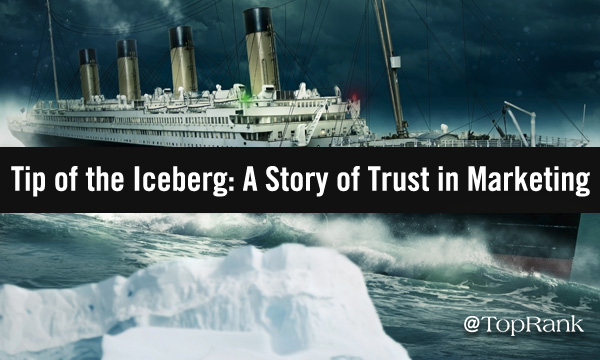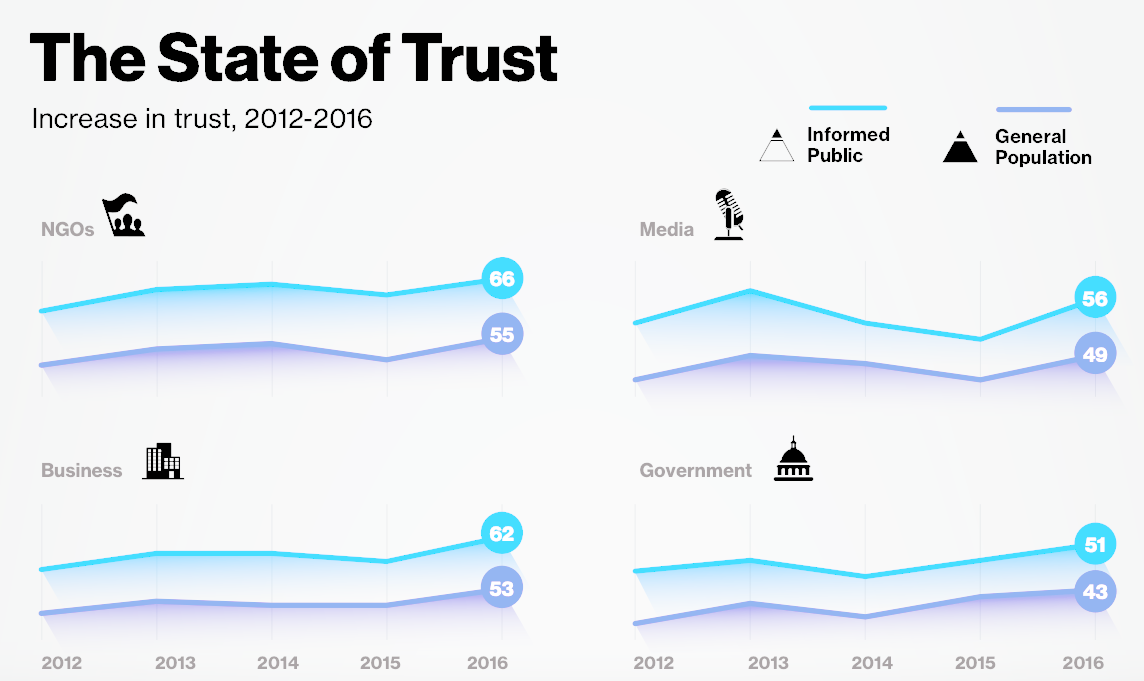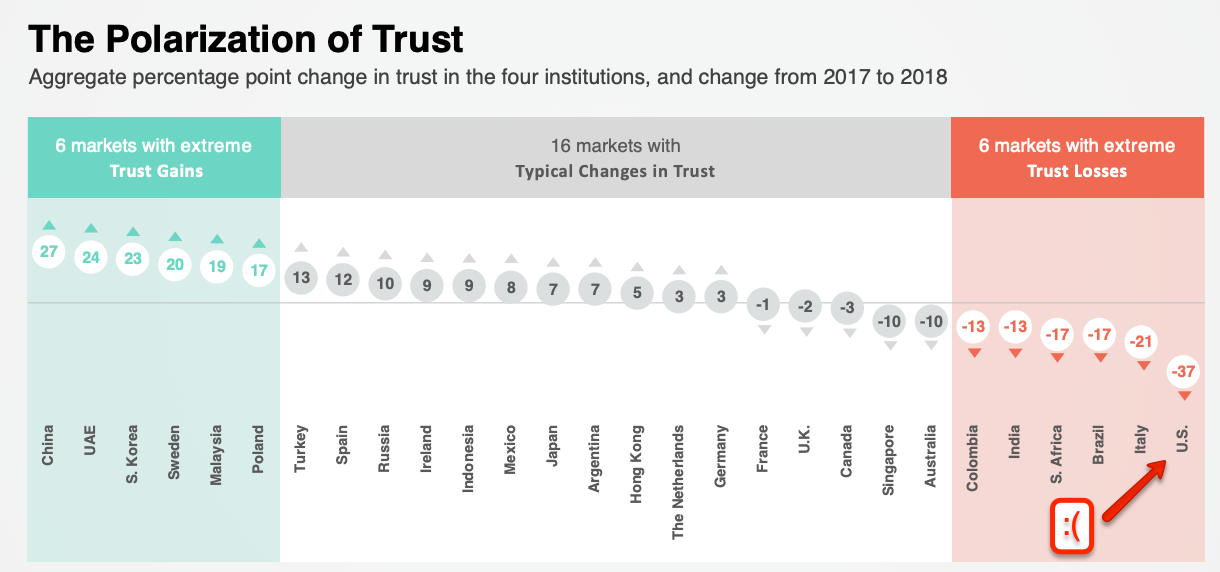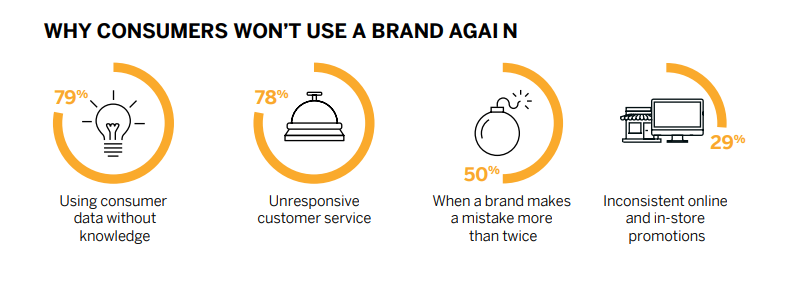
 “Step up on the railing. Hold on, hold on. Keep your eyes closed.” Jack is holding Rose around her waist, cautiously lifting her up to the Titanic’s bow. “Do you trust me?” He was a stranger up until days earlier, but still, her response is almost instantaneous. “I trust you.” Moments later, Rose opens her eyes and she’s flying, arms outstretched as the mighty liner propels her forward. She and Jack hold hands; they kiss. Celine Dion’s music wafts in the background. Teenage boys in the theater start gagging, while romantic types swoon. There’s a good chance you lived through this very experience. James Cameron’s 1997 cinematic landmark Titanic was an unprecedented hit, holding the title as highest-grossing film of all time for 14 years. The scene described above is perhaps its most famous — the linchpin in a love story sparked by deep, genuine trust that materialized almost out nowhere. When I say, “Everyone and their mom saw this movie,” I mean it a bit too literally because I actually saw it with my mom, as a 12-year-old, and it was… awkward. With that embarrassing story out of the way (I swear there’s a reason I mentioned it, and we’ll get back to it later), let’s move on to one you might actually care about: The state of trust in marketing. Strap on your lifejacket and prepare for a journey through these choppy waters...
“Step up on the railing. Hold on, hold on. Keep your eyes closed.” Jack is holding Rose around her waist, cautiously lifting her up to the Titanic’s bow. “Do you trust me?” He was a stranger up until days earlier, but still, her response is almost instantaneous. “I trust you.” Moments later, Rose opens her eyes and she’s flying, arms outstretched as the mighty liner propels her forward. She and Jack hold hands; they kiss. Celine Dion’s music wafts in the background. Teenage boys in the theater start gagging, while romantic types swoon. There’s a good chance you lived through this very experience. James Cameron’s 1997 cinematic landmark Titanic was an unprecedented hit, holding the title as highest-grossing film of all time for 14 years. The scene described above is perhaps its most famous — the linchpin in a love story sparked by deep, genuine trust that materialized almost out nowhere. When I say, “Everyone and their mom saw this movie,” I mean it a bit too literally because I actually saw it with my mom, as a 12-year-old, and it was… awkward. With that embarrassing story out of the way (I swear there’s a reason I mentioned it, and we’ll get back to it later), let’s move on to one you might actually care about: The state of trust in marketing. Strap on your lifejacket and prepare for a journey through these choppy waters...
By the Numbers: The State of Trust in Marketing
At the outset of 2016, trust toward all four institutions measured by Edelman Trust Barometer reached their highest levels since the Great Recession, with businesses seeing the largest spike.
(Source)
Things looked good. Confidence was high. We were all cruising merrily along. Then, we hit the iceberg that was 2016. You might remember that year not-so-fondly, for any number of reasons. The following year, Edelman declared that “trust is in crisis around the world,” citing an unprecedented drop across all four institutions. The 2018 research revealed “a world of seemingly stagnant distrust,” with no rebound to be seen. Things weren’t merely stagnating everywhere, though... In 2018, only 48% of people in the United States said they trust businesses, down from 58% in 2017. (Edelman)
(Source)
This was a point where people were frantically piling into lifeboats. I think I just saw Billy Zane kick a little kid off one. What a jerk. Anyway, this is a problem. [Side note: If you’re noticing a lot of Edelman citations thus far, it’s because their Trust Barometer is such a valuable resource for the topic, and offers a consistent baseline to show the progression of trust. But there are plenty of other sources to come.] 63% of people agree with this statement: “A good reputation may get me to try a product—but unless I come to trust the company behind the product I will soon stop buying it, regardless of its reputation.” (Edelman) Oh, and: 68% of adults in the U.S. say that trust in a brand has "a great deal" or "a lot" of influence on their decision when making a big purchase. (SurveyMonkey) I’m not exactly sure what the difference is between “a great deal” and “a lot,” but alas... We've reached an era where people at large are digitally adept and savvy. They know they have a world of options at their literal fingertips, and can thusly hold brands to the highest of standards. Trust strikes a deep emotional chord. “The digital era has fundamentally shifted assumptions for how individuals will do business and engage with companies," Kevin Cochrane, Chief Marketing Officer at SAP, wrote at Harvard Business Review last year. "Once trust has been lost, it’s nearly impossible for brands to rebuild sustainable, honest relationships with their customers." In other words: once the ship has sunk, it ain't coming back up. [bctt tweet="Once #trust has been lost, it’s nearly impossible for brands to rebuild sustainable, honest relationships with their customers. - @kevinc2003 #ContentMarketing" username="toprank"] Some of the damage has already been done. A few months ago, Accenture released its Bottom Line on Trust report, which uses an "Accenture Strategy Competitive Agility Index” to “quantify the impact of trust on a company’s bottom line." Scoring more than 7,000 companies, this system found that... 54% have experienced a material drop in trust at some point during the past two and a half years, "conservatively" losing out on $104 billion in revenue. (Bottom Line on Trust) "In today’s world, it is no longer a question of if a company will experience a trust incident, but when," the report asserted. This is getting grim, I know. But we're not underwater yet. There is time yet to turn this troubling tide, and as the primary conduits between customers and brands, marketers can and must be at the forefront. Marketing executives at B2B and B2C service firms rank “trusting relationships” ahead of “low price” and “superior innovation” among their customers' priorities. (The CMO Survey)
(Source)
As we build relationships, we build trust. Edelman's 2018 report found that company content is twice as trusted after a customer-brand relationship has been formed. Marketing has a lot of functions (even a great deal of functions?) but this one will be most vital in the months ahead. All of our efforts are doomed without this crucial piece of the puzzle. So, how do we stay on course and prevent relationships from sinking? Well... 65% of business buyers say they’re likely to switch brands if vendors don’t make an effort to personalize communications to their company. 52% of consumers say the same. (State of the Connected Customer) This seems to be the the sweet spot. Personalization is the surest way to build a rapport in the digital space. When we fail to connect, it sets off immediate alarms. Personalization comes in many forms. It can be as sophisticated as using adaptive AI, or as simple as narrowing the scope and voice of your content to resonate with very specific audiences. Whatever the approach, customers clearly want it. And the potential revenue benefits are undeniable. [bctt tweet="#Personalization is the surest way to build a rapport in the digital space. When we fail to connect, it sets off immediate alarms. @NickNelsonMN #ContentMarketing" username="toprank"] Personalization can deliver 5-8 times the ROI on marketing spend, and can lift sales by 10% or more. (McKinsey & Company) Now that sounds like smooth sailing. Research makes clear that marketers are wise to chart a course for more personalized waters. Granted, that’ll mean different things to different organizations and strategies, but it simply must be a central focus if we are to stay afloat. Personalized marketing is the byproduct of turning customer data into useful insights. It’s the industry’s prime directive as we speak. I’m excited to see what we can accomplish on this front in 2019 and beyond. I will leave you with one final word (statistic) of caution, however. 79% of consumers will leave a brand if their personal data is used without their knowledge. (SAP Hybris Consumer Insights Report) Let’s steer clear of that. Transparency is now more essential than ever in marketing. Using data is not wrong — in fact, it’s requisite for personalization — but the last thing you want to come off as is sneaky or underhanded about it (just ask Facebook). Something as simple as a friendly, casual pop-up message on your website informing visitors that you use cookies (and why) can go a long way. By following the principles of responsible personalization, we as marketers can right the ship and play our part in building sturdy relationships that ensure customers... via GIPHY
Let’s steer clear of that. Transparency is now more essential than ever in marketing. Using data is not wrong — in fact, it’s requisite for personalization — but the last thing you want to come off as is sneaky or underhanded about it (just ask Facebook). Something as simple as a friendly, casual pop-up message on your website informing visitors that you use cookies (and why) can go a long way. By following the principles of responsible personalization, we as marketers can right the ship and play our part in building sturdy relationships that ensure customers... via GIPHY
Moral of the Story: Steer Toward Trustful Shores
A bit of good news: in the 2019 Edelman Trust Barometer results, released a couple of weeks ago, trust toward business increased in 21 of 26 markets, including the U.S. where 54% of respondents voiced confidence — one of the biggest jumps. Now, we need to stay that course. At a high level, personalization should be the true-north on every marketer's strategic compass. But on a day-to-day tactical basis, I believe there are three focal areas for continually building trust. As it happens, I've attempted to incorporate each into this blog post you're reading. Storytelling. My goal here was to take a set of statistics and craft them into a coherent narrative. For added effect, I juxtaposed it against another extremely recognizable story. Your mileage may vary on the wisdom and effectiveness of this particular approach. Authenticity. For better or worse, this is who I am. I’m the kind of guy who intertwines 20-year-old movies with blog posts about marketing. (More seriously, I have a genuine passion for the subject of trust in marketing, which is why I write about it so frequently here.) Transparency. Even — no, especially — when it’s information you’re not entirely jazzed to be sharing. I didn’t love telling you all about sitting uncomfortably next to my mom during the infamous “Draw me like one of your French girls” scene at age 12, but I did so with the hopes it’d signal an openness and candor in the writing to come. Recently I highlighted a company called Lemonade that runs a “Transparency Chronicles” series, in which they speak very frankly about their experiences as a growing business — including their failures and shortcomings. Customers are tired of hearing how great and perfect brands are. They want realness. Content marketing strategies founded on personalization, with storytelling, authenticity, and transparency as cornerstones, will be primed to stand the test of time in an age of digital disorientation. Maybe, one day, we can finally restore the fundamental trust that’s been shattered ever since some genius marketing mind came up with the “Unsinkable Ship” slogan. Did you like this post? Want to read more from me on trust and transparency in marketing? Check out these past articles:- Two Key Marketing Opportunities Amid Stories of Fake Traffic and Fraudulent Metrics
- In a World of Diminishing Trust, Data-Driven Marketers Can Turn the Tide
- Be Like Honest Abe: How Content Marketers Can Build Trust Through Storytelling
- How Brands Can Avoid the Dreaded Fauxthenticity Pitfall
The post Tip of the Iceberg: A Story of Trust in Marketing as Told by Statistics appeared first on Online Marketing Blog - TopRank®.
from Online Marketing Blog – TopRank® http://bit.ly/2thdV9Q
via IFTTT
